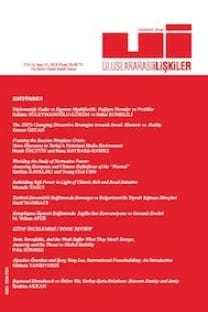‘Terörle Mücadele’ ve Hegemonya: 11 Eylül Sonrasında Terörizm Bağlamında Uluslararası Hukuk Oluşumu
Bu makale, tek taraflı güç ve Birleşmiş Milletler’in kolektif meşrulaştırma işlevi aracılığıyla, terörizm ile ilgili hegemonik hukuk oluşturma sürecini analiz etmektedir. Hegemonyanın kuvvet kullanımı ve terörizm konularında uluslararası hukuk normlarının gelişimini nasıl etkilediğini tespit etmek için, bu çalışma, uluslararası sistemin en etkili aktörü olarak Amerika Birleşik Devletler’inin 11 Eylül terör saldırıları sonrası, siyasi gücünü; yeni “ön-alıcı saldırı” normunu biçimlendirmek, ve Birleşmiş Milletler Güvenlik Konseyinde, 7.Bölüm kararlarını terörle mücadele konusunda uluslararası toplumu bağlayacak, hukuki kurallar oluşturmak için nasıl kullandığını ve nasıl kullanmaya çalıştığını incelemektedir.
Anahtar Kelimeler:
Terörizm, Hegemonya, Uluslararası Hukuk, Birleşmiş Milletler, Kolektif Meşrulaştırma
'War on Terror' and Hegemony: International Law-Making Regarding Terrorism After 9/11
The focus of analysis in this article is the process of hegemonic law-making regarding terrorism utilizing unilateral power and the collective legitimization function of the UN. In order to explore how hegemony influences the development of international legal norms concerning the use of force and terrorism, the article examines the ways in which the United States as a prevailing actor in the international system has sought to translate its political power to develop a new norm of preemption and to impose international legal obligations on states with regards to the suppression of terrorism through the United Nations Security Council’s Chapter VII resolutions after September 11 terrorist attacks
Keywords:
Terrorism, Hegemony, International Law, United Nations, Collective Legitimization,
- ISSN: 1304-7310
- Başlangıç: 2004
- Yayıncı: Uluslararası İlişkiler Konseyi Derneği İktisadi İşletmesi
Sayıdaki Diğer Makaleler
Ortadoğu’da Terörle Mücadele Aracı Olarak Demokrasi: Kandırmaca mı?
Korkmamız Gereken Tek Şey: 11 Eylül Sonrasında Güvensizliğin Kurumsallaşması
11 Eylül’den 10 Yıl Sonra Terörizm Çalışmaları: Başarılar, Konular ve Sorunlar
“Yeni Terörizm”i Tanımlamak: Küresel Risk Toplumunda Düşmanın Yeniden Yapılandırılması
Ken BOOTH ve Tim DUNNE, Çağımızda Terör
Terörizm Hala Demokratik Bir Olgu mu?
‘Eski’ Terörizm ‘Yeni’ Terörizme Karşı: İsim Ne İfade Ediyor?
‘Terörle Mücadele’ ve Hegemonya: 11 Eylül Sonrasında Terörizm Bağlamında Uluslararası Hukuk Oluşumu
